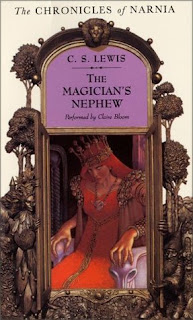The Magician's Nephew. The Chronicle's of Narnia #1. C.S. Lewis. 1955. HarperCollins Publishers. Pages: 221. [Source: Childhood Gift]
He never finished what he was going to say for at that moment something happened. The high-backed chair in front of the fire moved suddenly and there rose out of it - like a pantomime demon coming up out of a trapdoor - the alarming form of Uncle Andrew. They were not in the empty house at all; they were in Digory's house and in the forbidden study! Both children said "O-o-oh" and realized their terrible mistake. They felt they ought to have known all along that they hadn't gone nearly far enough.
• • •
Make your choice, adventurous Stranger;
Strike the bell and bide the danger,
Or wonder, till it drives you mad,
What would have followed if you had.
• • •
The Magician's Nephew continues to be my favourite Narnia novel. It's not because it's the first novel, no, it's because of what Digory and Polly have to go through and what they see on their way to and while they're in Narnia.
I can still remember the day when my father gave me my boxed set of The Chronicles of Narnia - I was in second grade, I think, and I was getting ready to go to an assembly with my father at the school I was going to (Comox Elementary, which has sadly been closed down). He handed me the boxed set and let me open it, and told me he would read the books to me whenever he could. And he did, though the last novel I remember that he read to me was The Horse and His Boy. I read the rest by myself because my father, I guess, soon became too busy to just sit down and read to me.
The story starts with Polly playing out in the garden when a boy peeks his face up over the wall dividing his garden from her own. The boy, who she was soon to learn was named Digory, was crying because of how ill his mother was getting. After that meeting, they become good friends and go regular little adventures, you know, the kind kids like to do.
But one day, they go up into the attic and decide to try and go explore the empty row house attached to their houses. But they make a grave mistake and accidentally enter into Digory's attic, where they discover that his uncle has converted the attic into a study...
This has to be my most favourite Narnia novel. There's so many things that happen in it that make me think. Think, think, THINK, think, THINK! And I love it when a book makes me THINK.
One of the parts of the books that makes me think the most is the part when Digory and Polly appear in Charn and take in what's left of that world. The fact that Charn's sun is red and "tired"-looking immediately makes me think that Charn's sun was a red giant - which is a star that has reached the end of it's life. It was hanging low over the horizon, so it made me think that it had probably swelled from its original size and took up most of the sky by the time Digory and Polly got there. Charn was an old world, and yet the sun had always been large and red, according to Jadis.
The fact that Charn was no more by the time Digory and Polly's adventure in Narnia was over unsettles me a bit, and I don't know why.
I deeply love C.S. Lewis' style of writing in this book. It makes it sound like a lovely fairy-tale and it sucks me in every time I open this story. I look forward to the day I can read it to my kids, like my father did to me.
One thing I wish I could do, though, was find one of the sets of green and gold rings that Uncle Andrew created. I would love to explore the Wood between the Worlds, just to see what other worlds there could have been. My curiosity always gets to me like that. What other worlds were there other than ours and Charn and Narnia?
Note: I never realized, until now, that Digory and Polly lived in the Victorian era, when Sherlock Holmes still solved mysteries and the thought of motor-cars were still a bit of a ways away...





